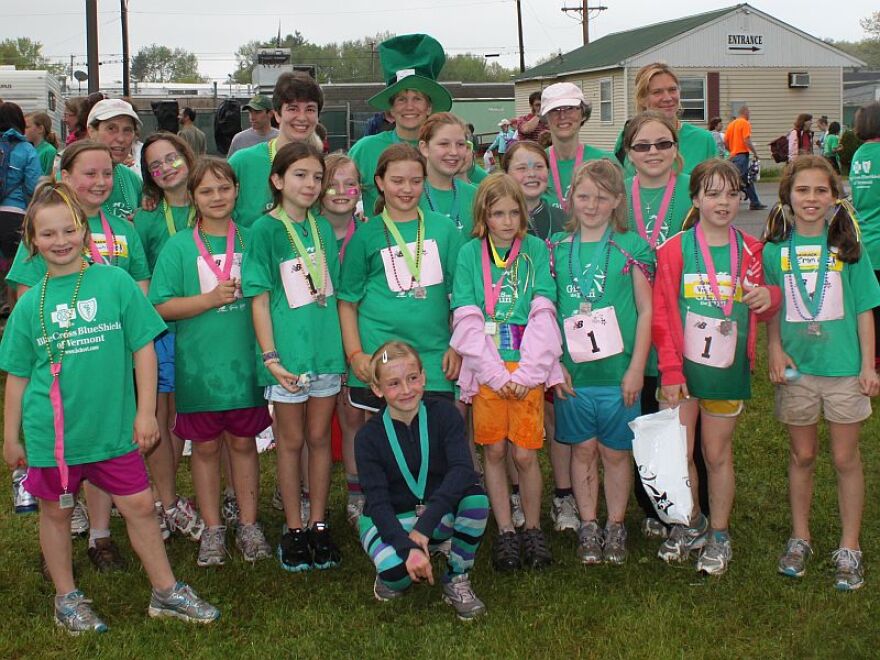Three Girls On The Run 5K events are being held across Vermont this season, in Brattleboro, Rutland and Essex Junction. For thousands of girls who participate, the race is the culmination of a twelve-week after-school program.
VPR’s Nina Keck has coached for Girls On The Run and says the program is about a lot more than running.
Something awful happens to little girls when they’re about ten years old. Research shows that when girls are nine, they’re on top of the world: they feel they can do anything and they’re just as likely as little boys to say they’ll be president some day. But after ten? Not so much.
Compared to boys, girls are much more likely to come out of adolescence with poor self-image, lower expectations from life and much less confidence in themselves and their abilities.
My 12-year old daughter loves a TV show called “Wipeout” where contestants race against each other on a huge obstacle course. The show can be a riot, but a few weeks ago they had a special episode pitting women against men, announcing that “the most beautiful women and the brainiest men” would compete against each other. They called it the match-up of the century: “the Hotties versus the Nerds.” Think about that for a minute.
At age ten, body image starts to become all-consuming for girls and studies show it’s when many girls begin to view their self-worth in terms of their sex appeal.
“It doesn’t really manifest until these girls are older,” says Molly Barker, the founder of Girls on The Run. “But it’s almost like it’s pouring into their spirits at that young age when they’re vulnerable. And they don’t really have the means to filter through or decipher what is right or what is wrong, or what is good for them or what is not.”
Barker is one of my heroes, mostly because she didn’t just sit back and pour another cup of coffee while all this depressing research came to light. Barker created something that would help girls fight back, filter out the harmful messages and celebrate their true, powerful selves.
“I started Girls on the Run for many reasons,” says Barker. “To give girls the tools and the awareness of these tactics at an early age, so when they begin to manifest in their adolescence they can say, ‘Hey wait a minute, I learned back then that none of this is real. And as a matter of fact, this in some ways may demean who I am, and so let me choose what may enhance my potential rather than take away from it.’”
Barker started Girls on the Run back in 1996 in Charlotte, North Carolina with 13 girls and a goal to help them get stronger physically and mentally. Seventeen years and 600,000 girls later the program is now operating coast to coast and across Vermont.
At Barstow Memorial School in Chittenden, third, fourth and fifth graders run laps around the school. These girls meet twice a week for 90 minutes of running, playing and talking. Today’s lesson is about community and cooperation. Each time one girl completes a lap, a letter is added to a large message board. The 19 girls have to work together to run enough laps to create the entire message and already some girls are offering to run extra laps for another girl who’s not feeling her best.
One girl shouts that she likes running because it gets her energy out. As a coach, I too liked the running part, especially the big 5K we’d all run together at the end of the season.
But it was our daily discussions that I remember most: sitting in a circle talking about why gossip is so hurtful, or why some emotions are more painful than others. We’d talk about inner beauty versus outer beauty, or describe the qualities we most like in our friends.
I can’t tell you how often I was blown away by something said in that circle. Little girls can be incredibly wise and insightful, like 9-year old Emily Freemann. “I learned that at Girls on the Run I could trust people and I could be who I want,” says Freemann, who’s just finishing her first year in the program. “They teach us friendship. And a lot of the activities have running in it but honestly, I think they should call it ‘Girls On Friendship.”
It starts to rain and Emily and the rest of the group finish their laps. There is something so joyful about little girls running together. They hold hands, they skip, they hop, they jump in puddles. It’s like all this beautiful energy, this shining potential. Potential that gets erased too quickly if we’re not careful.





